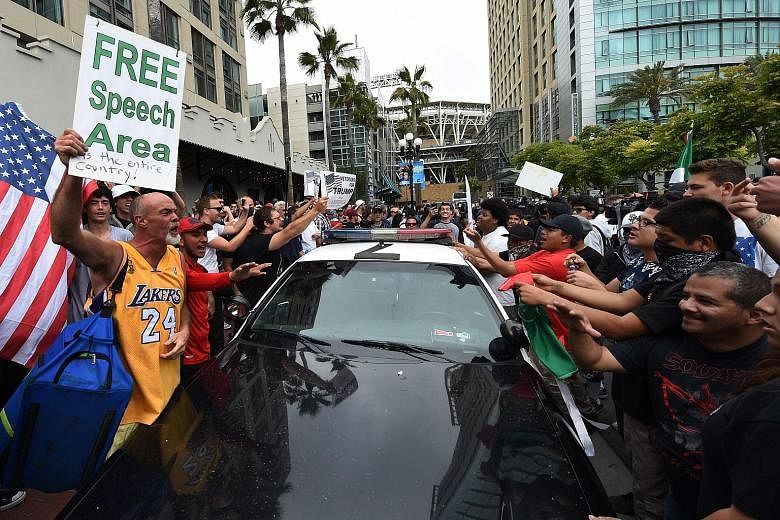WASHINGTON • The comparison was inflammatory, to say the least. Former governor William F. Weld of Massachusetts equated Mr Donald Trump's immigration plan with Kristallnacht - the night of horror in 1938, when rampaging Nazis smashed Jewish homes and businesses in Germany and killed scores of Jews.
But, if it was a provocative analogy, it was not a lonely one. Mr Trump's campaign has engendered impassioned debate about the nature of his appeal and warnings from critics on the left and the right about the potential rise of fascism in the United States.
More strident opponents have likened Mr Trump to German dictator Adolf Hitler and Italian fascist Benito Mussolini.
To supporters, such comparisons are deeply unfair smear tactics used to tar conservatives and scare voters. For a bipartisan establishment whose foundation has been shaken by Trump's ascendance, these backers say, it is easier to delegitimise his support than to acknowledge widespread popular anger at the failure of both parties to confront the nation's challenges.
But the discussion comes as questions are surfacing around the globe about a revival of fascism, generally defined as a governmental system that asserts complete power and emphasises aggressive nationalism and often racism.
In places such as Russia and Turkey, their leaders, Mr Vladimir Putin and Mr Recep Tayyip Erdogan respectively, employ strongman tactics. In Austria, a nationalist candidate came within three-tenths of a percentage point of becoming the first far-right head of state elected in Europe since World War II.
In Hungary, an authoritarian government has clamped down on the news media and erected razor wire fences to keep out migrants. There are worries that Poland could follow suit.
Traditional parties in France, Germany, Greece and elsewhere have been challenged by nationalist movements amid an economic crisis and waves of migrants.
In Israel, fascism analogies by a former prime minister and a top general have again inflamed the long-running debate about the occupation of Palestinian territories.
Mr Mark Leonard, director of the European Council on Foreign Relations, said: "The crash of 2008 showed how globalisation creates losers as well as winners.
"In many countries, middle-class wages are stagnant and politics has become a battle over a shrinking pie. Populists have replaced contests between left and right with a struggle between cosmopolitan elites and angry nativists."
That dislocation may not lead to a repeat of Europe in the 1930s, but it has fuelled a debate about global political trends.
There is a tendency at times to try to fit current movements into understandable constructs - some refer to terrorist groups in the Middle East as Islamofascists - but scholars say there is a spectrum that includes right-wing nationalism, illiberal democracy and populist autocracy.
"On a world level, the situation that affects many countries is economic stagnation and the arrival of immigrants," said Mr Robert Paxton, a professor emeritus at Columbia University and one of the most prominent scholars of fascism. "That's a one-two punch that democratic governments are having enormous trouble in meeting."
Americans are used to the idea that other countries may be vulnerable to such movements but, while figures like demagogic radio broadcaster Father Charles Coughlin enjoyed wide followings in the 1930s, neither major party has nominated anyone like Trump.
Mr Robert Kagan, a scholar at the Brookings Institution known for hawkish internationalism, said: "This could be one of those moments that's quite dangerous, and we'll look back and wonder why we treated it as ho-hum at a time when we could have stopped it."
Mr Trump has provided plenty of ammunition for critics. He was slow to denounce the white supremacist David Duke and talked approvingly of beating up protesters. He has praised Mr Putin and promised to be friends. He would not condemn supporters who launched anti-Semitic blasts at journalists.
Mr Trump's allies dismiss the criticism as politically motivated and historically suspect.
The former Republican House speaker Newt Gingrich, who has said he would consider being Mr Trump's running mate, said in an interview that he was "deeply offended" by what he called "utterly ignorant" comparisons.
"Trump does not have a political structure in the sense that the fascists did," added Mr Gingrich, a one-time college professor who earned his doctorate in modern European history.
"He doesn't have the sort of ideology that they did. He has nobody who resembles the Brownshirts (Nazi militia). This is all just garbage."
NEW YORK TIMES

